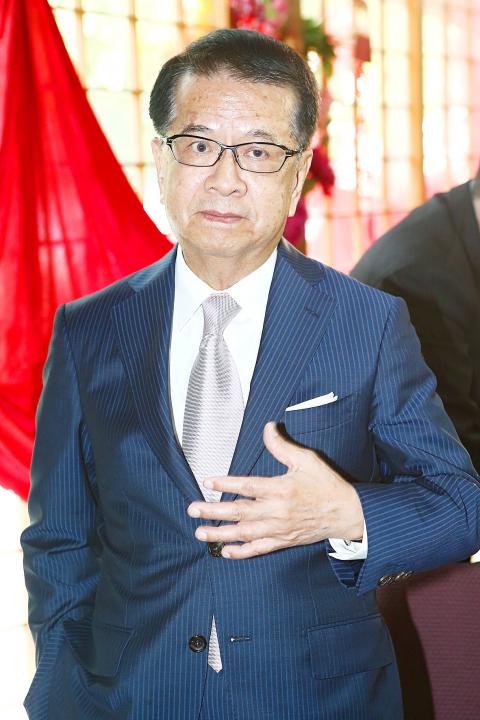Pxmart Co Ltd (全聯實業), which operates one of the nation’s largest supermarket chains, yesterday confirmed that company president Hsu Chung-jen (徐重仁) would retire in September.
Hsu — who has been in charge of Pxmart since 2014 — is to step down from the management team next month and officially retire by the end of September, the company said in a statement, citing personal career planning reasons.
Hsu, who has worked in the retail industry for more than 30 years, is also known for turning President Chain Store Corp (PCSC, 統一超商) into the nation’s largest convenience store chain operator, serving as its president prior to joining Pxmart.

Photo: Chen Yi-kuan, Taipei Times
Pxmart named CEO James Hsieh (謝健南) as president, saying he would lead its expansion plans.
Hsieh previously served as chief operating officer of PCSC and as CEO of Gourmet Master Co (美食達人), which operates popular cafe and bakery chain 85°C (85度C)
Hsu is stepping down because he and Pxmart chairman Lin Ming-hsiung (林敏雄) disagree about the company’s future plans, the Chinese-language Economic Daily News reported.
However, at a news conference yesterday, Hsieh denied the report, saying that Hsu had as early as last year decided to retire.
“The company’s long-term operations objective will not change, but we might take different measures [to achieve it],” Hsieh said.
Pxmart, which operates 910 outlets nationwide, said it aims to increase the number of its stores to 1,000 and boost annual sales from about NT$101 billion (US$3.33 billion) last year to more than NT$200 billion.
The company’s brand image has taken a beating since comments by Hsu about low salaries sparked a backlash among young people.
At a book launch in April, Hsu accused young people of “spending beyond their means on trips abroad and the latest mobile phones,” saying that the younger generation should endure low wages rather than complain.
He later apologized on Facebook after the company’s page was bombarded with irate messages from young people.
Pxmart last month apologized to film director Wu Nien-jen (吳念真), who complained on Facebook about the company’s use of his image in marketing materials without asking for his permission.

CALL FOR SUPPORT: President William Lai called on lawmakers across party lines to ensure the livelihood of Taiwanese and that national security is protected President William Lai (賴清德) yesterday called for bipartisan support for Taiwan’s investment in self-defense capabilities at the christening and launch of two coast guard vessels at CSBC Corp, Taiwan’s (台灣國際造船) shipyard in Kaohsiung. The Taipei (台北) is the fourth and final ship of the Chiayi-class offshore patrol vessels, and the Siraya (西拉雅) is the Coast Guard Administration’s (CGA) first-ever ocean patrol vessel, the government said. The Taipei is the fourth and final ship of the Chiayi-class offshore patrol vessels with a displacement of about 4,000 tonnes, Lai said. This ship class was ordered as a result of former president Tsai Ing-wen’s (蔡英文) 2018

UKRAINE, NVIDIA: The US leader said the subject of Russia’s war had come up ‘very strongly,’ while Jenson Huang was hoping that the conversation was good Chinese President Xi Jinping (習近平) and US President Donald Trump had differing takes following their meeting in Busan, South Korea, yesterday. Xi said that the two sides should complete follow-up work as soon as possible to deliver tangible results that would provide “peace of mind” to China, the US and the rest of the world, while Trump hailed the “great success” of the talks. The two discussed trade, including a deal to reduce tariffs slapped on China for its role in the fentanyl trade, as well as cooperation in ending the war in Ukraine, among other issues, but they did not mention

HOTEL HIRING: An official said that hoteliers could begin hiring migrant workers next year, but must adhere to a rule requiring a NT$2,000 salary hike for Taiwanese The government is to allow the hospitality industry to recruit mid-level migrant workers for housekeeping and three other lines of work after the Executive Yuan yesterday approved a proposal by the Ministry of Labor. A shortage of workers at hotels and accommodation facilities was discussed at a meeting of the legislature’s Transportation Committee. A 2023 survey conducted by the Tourism Administration found that Taiwan’s lodging industry was short of about 6,600 housekeeping and cleaning workers, the agency said in a report to the committee. The shortage of workers in the industry is being studied, the report said. Hotel and Lodging Division Deputy Director Cheng

TOKYO SUMMIT: The new Japanese PM’s words have demonstrated Japan’s ‘firm position on urging the prioritization of cross-strait peace,’ the foreign ministry said Minister of Foreign Affairs Lin Chia-lung (林佳龍) yesterday thanked US President Donald Trump and Japanese Prime Minister Sanae Takaichi for supporting peace in the Taiwan Strait, a day after the two at a summit in Tokyo emphasized the importance of regional stability and ahead of a meeting between Trump and Chinese President Xi Jinping (習近平) in South Korea today. The previous day’s meeting was the first time Takaichi had met with the US leader since becoming Japanese prime minister, the Ministry of Foreign Affairs said in a statement. Since taking office on Tuesday last week, Takaichi has urged the international community to